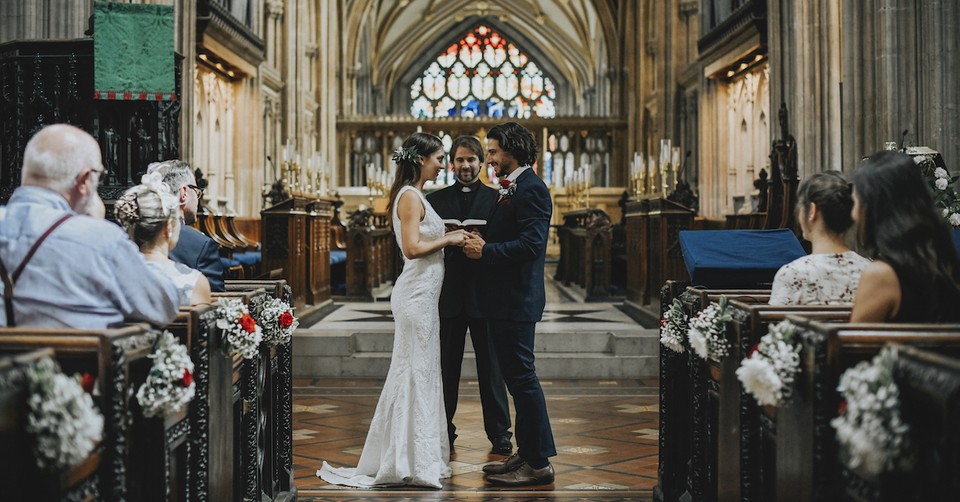Do Marriage Vows Come from the Bible?

It’s the moment of a wedding ceremony that can make anyone’s heart flutter just a little: the reciting or reading of the marriage vows. Within this short segment of a wedding, a man and a woman pledge to love one another in sickness and in health, in good times and bad, and will stay together until death parts them. No matter what the outcome of the marriage will be from there, the vows are the one moment in the wedding ceremony where the couple not only speak to one another (even if it is to just say “I do”), but convey their desire for their marriage to each other to thrive and last.
In Christian marriages, the vows are very special as they are vows not made to just each other, but as a promise to God that this person will be treated with love and care, knowing he/she is a gift from God. But were marriage vows found in the Bible? How did marriage vows become such an intricate part of weddings over the years? And if you are a couple planning for upcoming nuptials, how should marriage vows be chosen that not only reflect your feelings that day for your new spouse but will encourage your heart every day for him/her in the days ahead?
Traditional Protestant Wedding Vows
Declaration of Intent
____, will you have ____ to be your wife, to live together according to God’s order in the holy estate of marriage? Will you love her as Christ loved the church and gave himself for her, will you comfort her, honor and cherish her, and forsaking all others keep yourself only for her, as long as you both shall live? ____- I Will
____, will you have ____ to be your husband, to live together according to God’s order in the holy estate of marriage? Will you love him, comfort him, respect and submit to him even as the church submits to Christ, and forsaking all others keep yourself only for him as long as you both shall live? ____- I Will
Exchange of Vows
I ____, take you ____, to be my wife, to have and to hold, from this day forward, for better, for worse, for richer, for poorer, in sickness and in health, to love and cherish, until death do us part. This is my solemn vow.
I ____, take you ____, to be my husband, to have and to hold, from this day forward, for better, for worse, for richer, for poorer, in sickness, and in health, to love and cherish, until death do us part. This is my solemn vow.
Exchange of Rings
With this ring I thee wed: with my body I thee honor: and with all my worldly goods, I thee endow. In the Name of the Father, and of the Son, and of the Holy Spirit. Amen.
There are other various protestant wedding vows that differ slightly in the Lutheran, Episcopal, Presbyterian, and Baptist churches etc. Also, there are four options for Catholic wedding vows, but this is the standard:
Priest (or deacon): Since it is your intention to enter into the covenant of Holy Matrimony, join your right hands, and declare your consent before God and his Church.
Groom: I, (name), take you, (name), to be my wife. I promise to be true to you in good times and in bad, in sickness and in health. I will love you and honor you all the days of my life.
Bride: I, (name), take you, (name), to be my husband. I promise to be faithful to you in good times and in bad, in sickness and in health, to love you and to honor you all the days of my life.
Origins of the Marriage Vow
Many, who may have attended a wedding or two, probably believe that marriage vows must have come from the Bible, given the notion of bride and groom resembling the eternal bride and groom (the church and Jesus, respectively). However, there is no mention of marriage vows within the pages of the Bible, as stated in an article from Billy Hallowell of Pure Flix. But that doesn’t mean the Bible isn’t involved somehow in the formation of wedding vows to express the love and joy a couple has for one another on this special day.
The first recorded wedding vows, which you commonly hear at some weddings (I thee __ take you __), is from the Book of Common Prayer by Thomas Cranmer, Archbishop of Canterbury, which originated also from the Sarum rite in England back during the medieval period. The Book of Common Prayer was written as a way to conduct church services when the Act of Uniformity in 1549 prevented Latin mass from occurring in England. These wedding vows were part of the book.
Well before Thomas Cranmer’s day, marriage wasn’t even considered something a man and woman did to show their love and union together but was typically done as a way of making peace or for trade purposes between clans and/or families. There were also, as many have seen in historical films, marriages that were arranged by the parents of the bride and groom to solidify kingdoms together or continue a certain bloodline or heritage. Though some arranged marriages still take place around the world, couples today more than likely are joining in marriage because they want to and not because of pressure from family, communities, or their culture.
Seeing Marriage as a Covenant Relationship
Depicted as early as in Genesis 6 of the Bible, when God began a covenant relationship with Noah, covenants were set between God and His people as a way of creating an oath of kinship between God and man. In Genesis 6, God set this covenant with Noah because Noah stood out among his heathen community for honoring God in all he did and said, thus finding favor with God. When people form a covenant with God, through Jesus, it is establishing a relationship of mutual love, respect, and care, praying to God in quiet time as well as in public calling out His name for help. In the same way, men and women enter into covenant relationships when they become engaged and get married, vowing to join together in mutual love, respect, and care as they are, hopefully, doing the same with God. Ephesians 5:30-32 even has the apostle Paul stating that just as we are members of God’s bones and flesh in the covenant, a man becomes one with his wife in a marriage covenant.
Despite society’s acceptance of divorce as normal in today’s world, in God’s eyes, marriage is seen as the leaving behind of what a person was as a single person to join together and become one with his/her spouse, just as one leaves behind the fleshly life in exchange for an eternal bond with God. It becomes more about how a husband and wife come together in mutual understanding and sharing of one another instead of just two people trying to start a covenant relationship while desperately holding onto their independence. We do the same at times in our relationships with God and this can sometimes lead to us not getting to where we need to be in our destined paths because of our constant drive to do things our way.
A covenant is different from a contract, as a contract can be voided out at any point (such as can happen in divorce) but a covenant, with a spouse and with God, is something meant to last and grow you as a person.
Types of Marriage Vows
Today’s use of marriage vows can be broken up into two categories: traditional and personal (as in handwritten). Traditional usually defines the stating of the vows mentioned before in the Book of Common Prayer, with the possibility of adding some of these recognized verses about marriage from the Bible into the vows, including 1 Corinthians 13:4-8, Genesis 2:24, and Ephesians 5:25.
Traditional can even be separated based on types of faiths/cultures, from Buddhist to Apache and Cherokee, to different denominations within Christianity: Lutheran, Jewish, Protestant, Baptist, Catholic, etc. There is also mention of non-denominational vows, which focuses more on the union between a man and woman as a union between each other and with no reference to God or a higher power, and through the tying of a knot in a unity ceremony.
Another popular option in weddings is for the bride and groom to write and recite their own vows, stating what is in their hearts about their future spouses and what they hope the next years of their lives will bring together. If you are writing your own vows, some suggestions of what to include might be telling a story about the love you share with your future spouse, who your intended is to you, and stating what it is you promise to do or be in your marriage, funny or serious. For my wedding, our minister adding in our vows “through good movies and bad,” as our wedding was movie-themed and we both loved movies (still do).
However way you choose to give your vows on your wedding day, the focus shouldn’t be on what style but what is said and meant in one’s heart. Even the simple statements of “I do,” “till death do us part,” and “from this day forward” are not just blanket phrases you say to make sure your marriage is legally binding but are statements showing this isn’t a marriage contract with your spouse but the beginning of a lasting marriage covenant for now and beyond.
Photo credit: ©GettyImages/Rawpixel

Originally published January 29, 2020.







